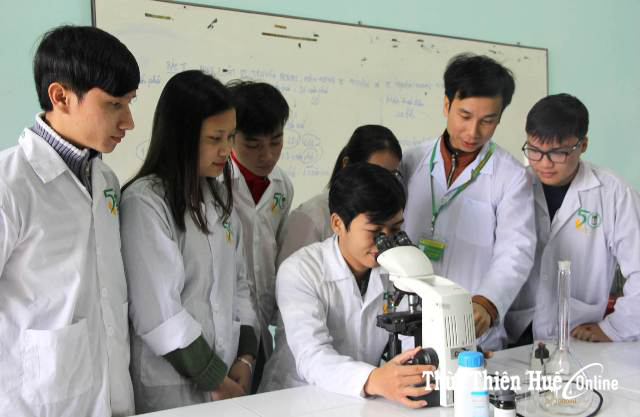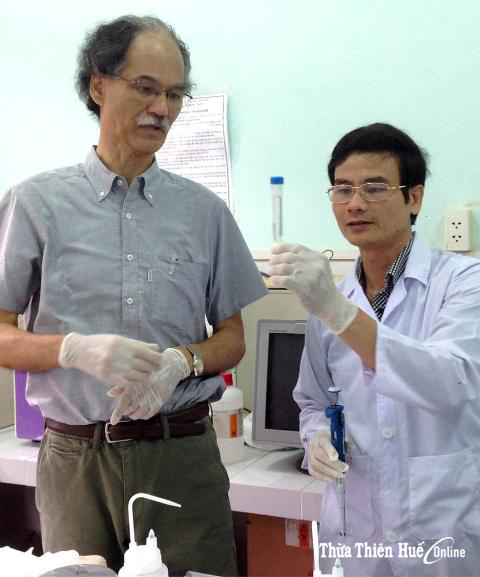
Students at the university of Agriculture and Forestry, Hue University, doing research
Dr. Cao Thien Tuong was born to a disadvantaged family in Vinh Hai Commune (Phu Loc District). Graduating from Hue University of Medicine and Pharmacy in the early 1990s, Dr. Tuong went to the South for job opportunity and was offered a position in a hospital outside Saigon. He took an in-service course to lead to the certificate of specialist doctor level 2, which granted him a position in the well-known hospital Cho Ray.
In the new workplace, Dr. Tuong soon established himself as a well-respected national leading doctor in radiology, specializing in neuro-radiology. Patients amicably called him “Dr. Tuong MRI” (who is a leading MRI diagnosing specialist), or “Dr. Hue origin”. Notably, Dr. Cao Thien Tuong always stays in contact with and devotes himself to his hometown despite his fully-scheduled work. We were especially impressed by his humility and intimacy.

Academics at the university of Agriculture and Forestry, Hue University, in an experience exchange with Japanese experts
The University of Medicine and Pharmacy – currently a member in Hue University system – where Dr. Tuong was trained, remains its high-ranking brand in higher education nationwide. Unfortunately, it is a heavy heart to see that the results of recent university entrance examinations have been quite low, and that many high school students have not decided on Hue University’s member institutions for their higher education, but Saigon, Hanoi and Danang instead. How can such a low input guarantee a qualified outcome?
Many of the students’ answer to our question as to why they did not study in Hue is that Hue still lacks a “studying environment” – by which they mean an opportunity in areal socio-economic development. In response to the same question, many leaders of member universities and Hue University have determined to overcome this challenge by reforming training programs and improving training quality.
In reality, affiliated institutions in Hue University are changing. Their investments in key programs, collaboration with other institutions in some training programs, and innovation in teaching and learning have taken effect to the extent that they better impart knowledge to students and prepare ground for their future employment. Typically, the University of Agriculture and Forestry has offered students international internship programs to Japan and Israel since 2007. Dr. Nguyen Van Hue, Deputy Head of the Department of Mechanics and Technology, believes that the most obvious advantage is students’ exposure to working environment and modern technology abroad, helping them sharpen their skills in their specialization. Moreover, even if they are in an internship, they are still well-paid, approximately VND 150-200 million per year. This is evident that the program is a good way of training, opening up prospects of training, human resources and employment opportunities for graduates.
Hue University has eventually gain certain fruits of years of durable efforts. In 2017, 6 out of 8 affiliated institutions completed the external accreditation carried out by the Center for Education Accreditation, Vietnam National University, Hanoi. Three universities (the University of Agriculture and Forestry, the University of Medicine and Pharmacy, and the University of Sciences) have been accredited. The remaining institutions, namely, the University of Education, the University of Economics and the University of Foreign Languages, which are positively appraised, are awaiting approval. These initial achievements demonstrate that higher education institutions within Hue University have evidence to establish their “trademark” and have confidence in learners and society.
Assoc. Dr. Huynh Van Chuong, Vice Director of Hue University said that in the accreditations, affiliated institutions of Hue University satisfied 82% - 89% of the criteria. The recognized strengths include the staff quality, with the large number of staff holding master and doctoral degrees and associate professor and professor titles; a variety of training programs, especially advanced programs. Compared to other institutions nationwide, these figures are quite high because very few institutions can pass 90% of the criteria except the International University, Vietnam National University – Ho Chi Minh City, and Vietnam National University of Agriculture.
In a recent meeting with Department of Livestock and Veterinary, the university of Agriculture and Forestry, Hue University, Mr. Ho Si Luong, Deputy General Director of Green Feed Vietnam Joint Stock Company, said that Hue students have advantages because they are hard-working, responsible and loyal to the work. These are the characteristics that businesses really need. These are the happy acknowledgments from the business.
Hue University has experienced more than 60 years of development up to this Spring. It has trained for the society many doctors, teachers, painters, engineers, journalists and many other bachelor holders of Hue origin. Wherever they are or whatever they do, they all give special impressions of the place where they once studied.
By MINH TAM